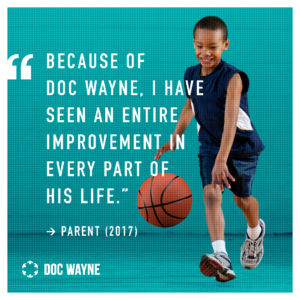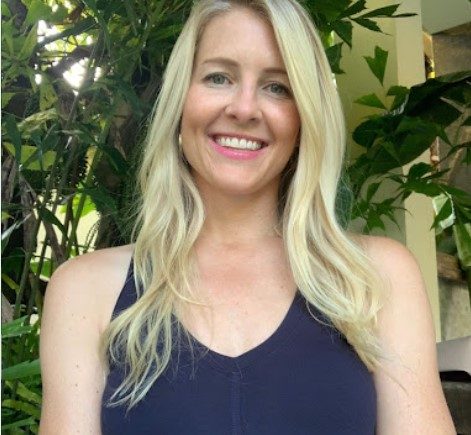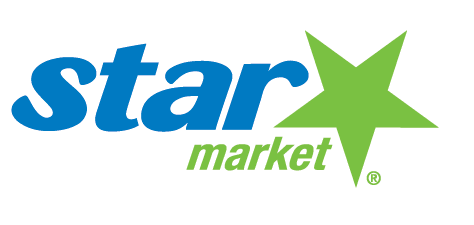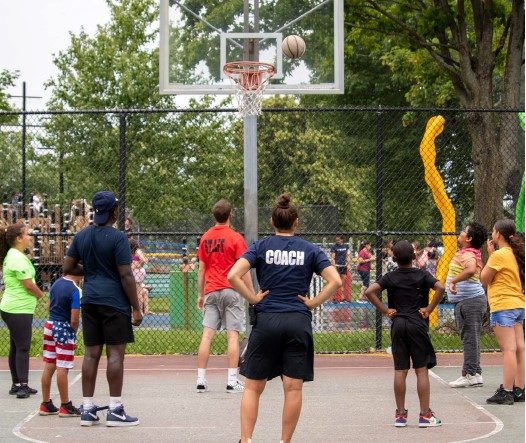The pandemic and other national and world conditions have led to an historic youth mental health crisis, with suicide now the second leading cause of death among children ages 10 to 14. Doc Wayne Youth Services addresses youth mental health through sports-based therapy. Star Market has donated more than $1,400 to this nonprofit through its GIVE BACK WHERE IT COUNTS Reusable Bag Program.
Tell us about Doc Wayne Youth Services.
The mission of Doc Wayne Youth Services is to provide brighter futures to youth and strengthen the field of mental health through sports-based therapy, which means that we fuse sports with therapy. We were founded in 2002 under an umbrella organization by Susan Wayne in memory of her brother who was a pediatric doctor and really believed in the power of sports for positive impact on youth.
Then in 2010, Doc Wayne branched out and became its own 501(c)(3). David Cohen became our first CEO over a decade ago, and he still is today. With very little in funding at the time, Becky Roulier, our deputy director, came on and joined him. Those two have built the team, and we have positively impacted the lives of hundreds of thousands of youth.
What sets you apart from other nonprofits in the community?
We are unique because we’re both a human service organization as well as a sport-for-social-change organization. And so over time, we’ve provided direct services, meaning we provide both group and individual therapy, and we also have two other programs as part of our clinical services.
We do something called Therapeutic Mentoring, and then we do Therapeutic Recess, which is actually where we have clinicians attend recesses at local schools and provide mental health services through sport.
We are unique because we’re both a human service organization as well as a sport-for-social-change organization.
And then we also have the Champions NetworkTM, a train-the-trainer model, where we train non-clinicians who are youth-facing on how to better identify and deal with mental health issues for the youth they serve. What’s unique about that is there is not a lot of access to mental health services due to either marginalized communities or it’s a cultural stigma or private insurance doesn’t accept it. In a lot of cultures that we serve, therapy is not an option. So, we now can train coaches and teachers who work with youth, backed by clinical research and clinicians, so that they feel comfortable in being able to deal with some of these mental health issues.
The other big thing that separates us is that we provide services directly in the communities that we serve. We started telehealth during COVID, and we can continue that for individual therapy. But we go directly to the schools and the communities to provide individual therapy, and we use sports for the social change portion of it. You see how many athletes right now are either struggling or speaking out about mental health. That gives us this whole sport lens and also gives us a chance to connect with athletes and hopefully amplify our voice.
Tell us a story that illustrates the good work you are doing.
When some people think of mental health, they don’t think about the idea that it’s okay to not be okay. And there are lots of people that struggle with it. So, Doc Wayne clinicians deal with some pretty serious trauma.
You’re looking at kids that have been exposed to domestic violence in the house or even sex trafficking. They’re dealing with major issues and the kids that actually come out of these homes find Doc Wayne clinical support is really positive.
And then you have the children that just don’t have access to therapy, and we’ve provided services to them. Pretty much every parent of a child that is part of our program says they’re better in school; they’re more focused; they’re better at home; they’re better dealing with their peers.
For example, let’s take playing a basketball game; there are a lot of different ways that you can integrate our award-winning curriculum into a basketball game. When someone’s struggling, their teacher recommends them for a Doc Wayne program. You see a lot of microaggression on the basketball court. The kids don’t know how to handle their anger. They might be a little rough and aggressive with their teammates or their opponents. But when they start going through Doc Wayne, that actually goes away. And then they’re able to just play. They can better handle their emotions and that parlays far off the field into the school room and also their home.
We serve a lot of Framingham public schools. Following a recent 60 Minutes episode that was all about mental health, the Framingham superintendent basically told our CEO that you could cut and paste that for almost any school district and the amount of good work that Doc Wayne is doing for their peers is just incredible.

What is your greatest achievement or contribution to the community?
We are most proud of our award-winning curriculum where our staff has done such a good job of being able to actually combine clinical service with sports and what that means to be able to expand into different areas where we’re able to amplify our voice.
We’re not just clinicians serving the community through individual therapy. We’re actually out there in the communities. When you put a ball in somebody’s hand, you’re no longer talking about therapy. We don’t call our staff our clinicians. We actually call them coaches. And I think for that to stick for as long as it has, and for us to keep expanding, is probably one of our proudest moments, because it means what we’re doing is actually working. When we give surveys after a lot of our programming, we see at least 95% of people reporting positive feedback and basically a positive return to the work that they’re putting in with Doc Wayne.
And I think the other proud part of it is our ability to pivot. We’re doing a lot as a small nonprofit. Through the Champions Network, we’ve been able to train people all over the world on how to better deal with mental health. And during COVID we pivoted to telehealth and that’s huge. We’re a small nonprofit that was able to figure out how we can keep delivering our services. And we also accept some insurance and I think just having another revenue stream for a nonprofit is incredibly important.
When you put a ball in somebody’s hand, you’re no longer talking about therapy. We don’t call our staff our clinicians. We actually call them coaches.
How are you using the funds you’ve received from the Star Market GIVE BACK WHERE IT COUNTS Reusable Bag Program?
We apply it to our direct service work. It could be applied to a certain child to get a month’s worth of individual therapy or an individual session, or a group therapy session or a month of group therapy, for example. All of the money that we raise through the Star Market program goes straight back to the individuals being served by Doc Wayne.
Is there anything you’d like to add?
The pandemic has really strained everyone’s mental health. People haven’t been interacting as they normally do. We lost so many people to COVID. There are 425,000 kids who have lost parents to COVID, and there’s also a clinician shortage. Think about all of the people who need mental health services and the lack of people who can provide that.
What Doc Wayne is doing with our Champions Network is training folks to be able to better identify and deal with mental health issues in children. If you’re a youth soccer coach for your children’s team, this is something that you could use. If you’re a schoolteacher, all of the teachers in your school could get trained on this. It only takes two and a half hours and it’s all backed by clinicians. It helps the lay person be in a much more comfortable position to identify and deal with mental health issues, including referrals to services.


